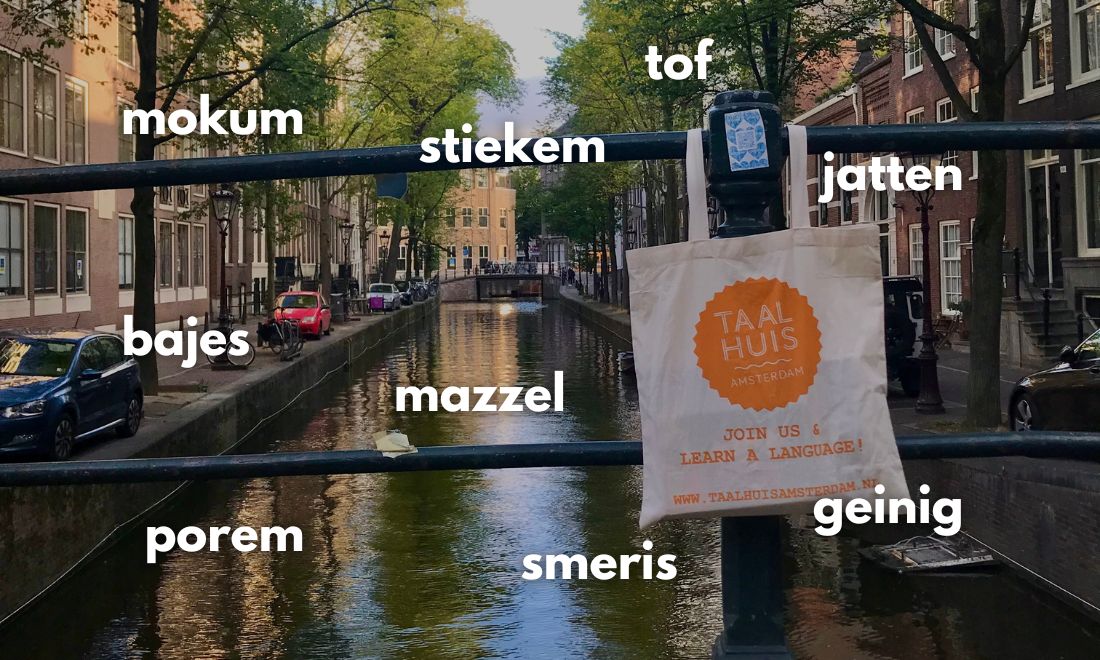Ever heard Johnny Jordaan’s Geef mij maar Amsterdam? In this famous ode to Amsterdam, he refers to the Dutch capital city as ‘Mijn Mokums paradijs’ (‘My Mokum paradise’). Just like the supporters of Ajax would call their football club ‘The Pride of Mokum’. And in Amsterdam you can also get yourself a drink at Bar Mokum, or have your hair cut at Mokum Barbers – the city’s nickname is basically everywhere.
The name Mokum isn’t really Dutch though. It originates from the Hebrew word maqom (מָקוֹם), meaning ‘place’. In the past, people who spoke Yiddish used to refer to some cities in the Netherlands and Germany by saying Mokum, in addition to the first letter of the name of the city (according to the Hebrew alphabet). So Amsterdam was called Mokum Alef (‘City A’), just like Rotterdam was Mokum Resh and Berlin was Mokum Beis. But only Amsterdam kept this as a nickname.
It’s only one of the many words with Hebrew roots that nowadays are regarded as typically Amsterdam, such as gabber (friend, ‘Mijn allerbeste gabber!’) and mesjogge (crazy, ‘Ben je helemaal mesjogge?’). Gabber comes from the Hebrew word for friend chaver (חבר), and mesjogge from mesjuge (משוגע), meaning crazy. These words are mainly colloquialisms, although some of them have been integrated all over the Netherlands and Belgium, like tof (from tov or טוֹב, meaning ‘good’).
These kinds of words came to the Netherlands through Yiddish, which is another language than Hebrew, to be clear. Although they are written in the same script, they’re not even part of the same family. Whereas Classical Hebrew is a Semitic language, Yiddish originates from a big Jewish community that lived in present-day Germany in the tenth century. They mainly spoke the local dialect, and only used Hebrew to pray and quote from the bible. Hebrew words did however end up in their dialect. And as they increasingly began to live isolated from the rest of the (German-speaking) population, a new language arose.
Yiddish spread across Europe, and made its way to the Netherlands as well. In the eighteenth century the language declined sharply, as the Jewish people assimilated with the rest of the population and Dutch became more important to them. From 1817, the use of Yiddish was even banned in (Jewish) schools and synagogues. But quite some words from Hebrew origins found their way into the Dutch language nonetheless.
Another example is jatten, which means both ‘to steal’ as ‘hands’ (or ‘hand’, if you just say ‘jat’). This comes from the Hebrew word jad (יד), also hand. If you would jat something and a smeris – cop in English, from the Hebrew šəmirā (שמירה, meaning ‘guard’) – would catch you, you might end up in the bajes. And that means prison, but comes from the word for house: bajit (בית). In Amsterdam, there used to be a prison called Penitentiaire Inrichting Amsterdam Over-Amstel, better known as the Bijlmerbajes. It was a huis van bewaring to be precise: a prison that holds prisoners awaiting trial or sentencing, or who were being held for a relatively short period. Indeed, a ‘house’ of custody.
The origins of the Dutch word bolleboos, a smart person, have to do with a house as well: it traces back to bá’al habáyit (בַּעַל הַבַּיִת), which means ‘master of the house’. Geinig, right? (funny, from the Hebrew word for likeability: chén or חֵן).
In the bajes you might try to escape stiekem – secretly, from the Hebrew sjtika (שתיקה), meaning ‘the silence’. Then you have to have quite some luck though, or mazzel, a word that originates from the Hebrew term mazal (מזל). Because if you get caught, there are no smoesjes left – a word Dutch people use for excuses, that derives from lisjmoa (לשמוע), the verb for ‘to hear’. You actually have many sores in that case, or tsará (צָרָה, meaning problems).
But if you are goochem enough, or khakhám (חָכָם, smart), you’ll find freedom, which you can celebrate with a jajem in a bar. In Amsterdam that would be a jenever, but it comes from the Hebrew word for wine: yáyin (יַיִן). Isn’t that tof? Hallelujah!
To round this blog, a little dictionary of Dutch words with Hebrew origins:
Gotspe
A grave insolence, from Hebrew חֻצְפָּה (ḥuṣpā). ‘Alles is misgegaan. Het is een gotspe!’
Gozer
Dude, guy, from Hebrew חָתָן (chatán, ‘bridegroom’). ‘Ik vind het maar een rare gozer.’
Kapsones
Pretensions, from Hebrew גאוותנות \ גַּאַוְתָנוּת (ga’av’tanút, ‘arrogance’). ‘Jij weet alles weer beter, wat een kapsones!’
Lef
Courage, from Hebrew לב (lev, ‘heart’). ‘Die jongen had heel veel lef.’
Pleite
Away, from Hebrew פְּלִיטָה (plitá, escape or getaway). ‘Ik ben pleite. Doei!’
Porem
Face, from Hebrew פָּנִים (pāním, ‘face’). ‘Ze gaf hem een harde klap op zijn porem’.
This blog was written by Dutch teacher Yoran.

